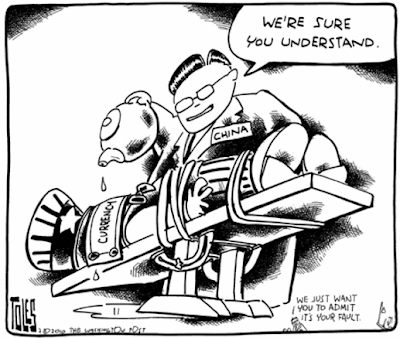Peter Schiff writes:
Much of the content of the latest Fed statement, released on September 21, echoes the central bank's previous post-credit crunch pronouncements: there is still too much slack in the economy, interest rates are still going to be near-zero for an "extended period," and the Fed will continue to use payments from its Treasury purchases to buy yet more Treasuries.
But this recent statement uses a new turn of phrase that should have Americans very upset.
The Fed says that
"measures of underlying inflation are currently at levels somewhat below those the Committee judges most consistent, over the longer run, with its mandate." Though the wording treads lightly, it should not be taken lightly.
It may signal the final push toward dollar collapse.The Fed's dual mandate, since an amendment in 1977, has been to promote "price stability" and "maximum employment." While often discussed as if both goals are complementary facets of one mandate, they tend to have been at odds during every recession since the Great Depression.
The problem is that central banks tend to keep interest rates too low for too long (usually to create a feeling of prosperity credited to the government), which then causes major asset bubbles. When the bubbles pop, there is a period of high unemployment during which prices are supposed to fall. Then, the central bank must choose between boosting short-term employment through inflation or defending price stability by allowing assets to return to a reasonable market value. Aside from the early 1980s chairmanship of Paul Volcker, the Fed has always chosen more inflation...
The truth has always been that whatever the question you ask the Fed, the answer is inflation. With prices drifting steadily upward since its establishment in 1913, I dare to ask:
has the Fed ever achieved its dual mandate?...All the salient indicators tell me that the global dollar crisis has entered a new phase. The Fed is getting more aggressive about money printing because it really doesn't have any other politically viable options. I've always said the Fed uses inflation to give appearance of prosperity, but I never expected them to come out and say it! You don't give warning when you're about to rob somebody, because then the victim might take precautions – in this case, buying gold and foreign equities.
read the entire essayMy thoughts: Bernanke will destroy the economy will his printing press. Expect significant inflation, war, and $4,000/oz gold before we have return of true prosperity.





